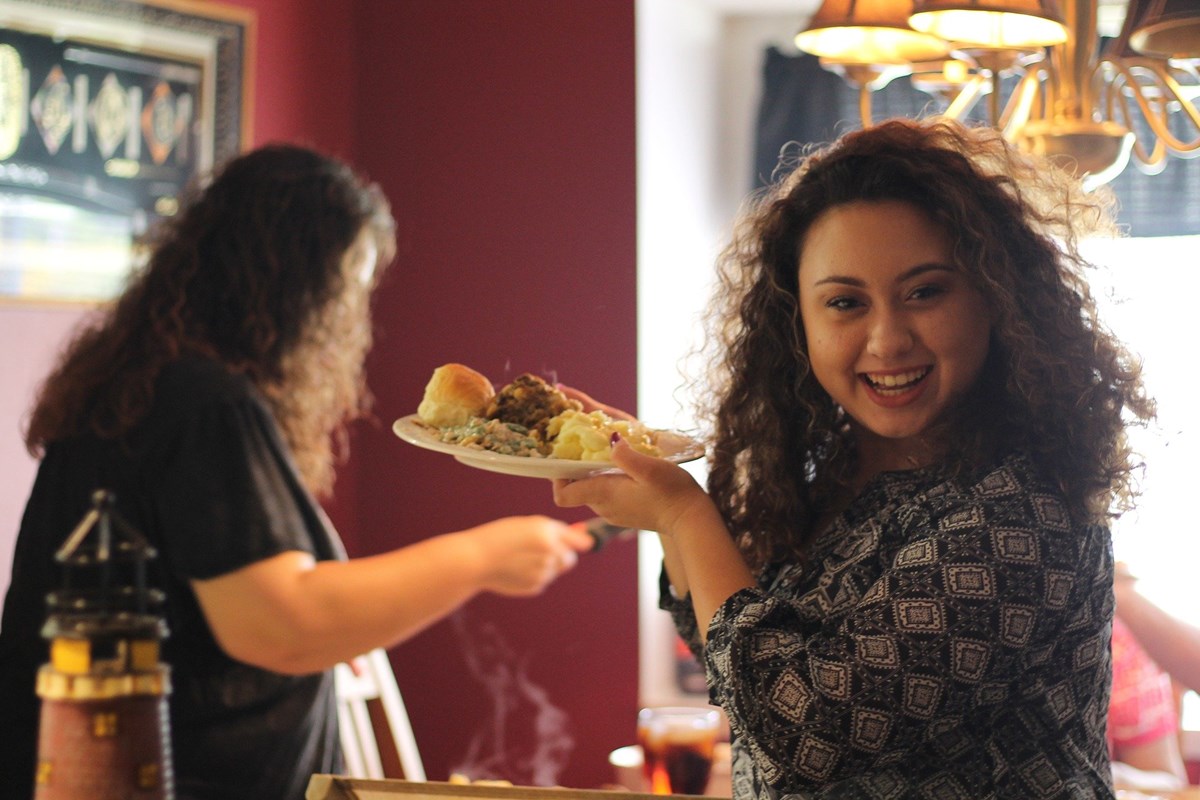I have a reputation for being a bit, well, boujee when it comes to food. It’s not unwarranted. I make no apologies for being vocally particular about what I eat, and I do indeed put my money where my mouth is—as it were.
But I’ve always been a fussy eater, as my parents will cheerfully tell you, and unwilling to settle for boxed mac-and-cheese even when I was waiting tables to scrape up rent money.
Thanksgiving is coming up, and a lot of people worry about spending a lot of money on food. The good news is, it is actually possible to eat real food without breaking the bank. To show you how you can have a Thanksgiving without ruining your budget, I made a full meal for the whole office at FEE for less than $30, and now I'm here to show you what I did and how it was possible.

That’s a 15-pound roasted turkey, gravy (I used dried thyme and omitted the parsley), fresh bread, apple-cranberry dressing (I left out the pecans on this one), green beans, roasted root vegetables, and cranberry crumble bars for dessert. All of it was almost completely from scratch, and according to my colleagues, it was all delicious. I’ll tell you how.
Time Preference
The first step to any budget meal is smart shopping. I had to go to two different stores to buy all my food. Could I have bought everything I needed at one or the other of them? Yes, I absolutely could have. Would I have stayed within my budget? No, I definitely would not have.
It’s the difference between paying $2.50 per pound for the turkey and paying 47 cents per pound for the turkey. I’m not interested in paying $37 for what I could get for $7. I also didn’t like paying $2 for a three-pack of yeast when I could get it for 79 cents. So I made the extra trip. But I couldn’t get the same deals on apples, cranberries, various vegetables, and herbs at the second store, so I definitely had to go to the first one.
How is it possible? How can good food be so cheap?
Economists call this time preference, and it answers the question, how much is convenience (time saved) worth to us? For an average dinner, that difference in price might have been too small to justify driving to another store. We'd rather pay $20 more at one store, rather than save the $20 and have to stop at two places.
For a big Thanksgiving meal on a tiny budget, I devalued my time and shopped longer to get lower prices. The difference in prices for a Thanksgiving meal, if I’d only shopped at one single store, would have been either as low as about $15 or as high as about $38. When money is tight, that’s a big enough difference to matter.
The same goes for pre-made food. Having someone else do the work takes a lot less of your time—this whole meal took an entire day to bring together in my kitchen, shopping aside—but it takes more out of your pocketbook. You have to decide what you value more, your time and effort or your bank balance.
Free-Market Magic
For this entire meal, I used:
- About 5 cups of flour ($0.45)
- About 3 cups of sugar ($0.59)
- ¼ teaspoon yeast ($0.03)
- About 3 tablespoons of salt ($0.04)
- About 2 tablespoons of black pepper ($0.21)
- 6 carrots
- 1 large sweet potato ($0.86)
- 2 large Yukon gold potatoes ($1.25)
- 4 yellow onions ($1.25)
- 1 head of garlic ($0.25)
- 6 stalks of celery ($1.14)
- 8 oz. white button mushrooms ($1.59)
- 1.73 pounds of green beans ($2.92)
- 1 lemon ($0.36)
- 3 apples ($1.54)
- 24 ounces of fresh cranberries ($3.38)
- 3 large chicken bouillon cubes ($0.50)
- 4 teaspoons dried thyme ($0.07)
- 2 teaspoons dried sage ($0.02)
- 2 tablespoons brown sugar ($0.04)
- 2 boxes of stuffing mix ($1.58)
- 3 sticks of butter ($2.24)
- 7 tablespoons cooking oil ($0.57)
- 1 egg ($0.06)
- 1 15.28 pound whole turkey ($7.18)
Grand total? $28.31. Here are the receipts.


I assumed you already had flour, sugar, butter, oil, salt, pepper, and an egg, but I did check the prices for those things.




How is it possible? How can good food be so cheap? Farm subsidies aside, they’re the same reasons pencils are so cheap: the incredible spontaneous order that comes from the division of labor and global trade.
When people and markets are free, individuals are able to do the things that they’re best at and enjoy most. Specialization doesn't just spare you boredom and effort—it creates more stuff to be shared among all. I don’t know how to grow carrots or refine sugar, but there are some people who do.
The farmer, and the land, that grows carrots best grows just carrots, and sells them to people like me, who'd have to spend a lot more time and money produce a carrot than a carrot-farmer. Factories that refine sugar do it faster and cheaper, and it becomes cheap for me to buy. I pay for the convenience of not doing it myself. Because people specialize, more things get done overall. Free, global trade raises the standard of living for everyone involved, every step of the way.
Goods become cheaper. And because there are all of these people who know how to do very specialized things that I don’t have any real interest in doing, I can concern myself with what I am good at: cooking food for my friends and family.
But all of the ingredients for this meal came from wildly different places. No single geographic area is suitable for raising all the different kinds of food that went into this meal. Sugar cane doesn’t grow under the same kinds of weather and soil conditions as wheat.
Getting all of these ingredients to the same places is dependent on the ability of people all over the world to trade freely with one another. Barriers to global trade like tariffs and quotas and other restrictive regulations inevitably cause the prices of those ingredients to go up in order to account for the cost of compliance. Free, global trade raises the standard of living for everyone involved, every step of the way.
Give Thanks
So, when you sit down to Thanksgiving dinner, whether you had a hand in cooking it or not (and if you didn't, at least offer to do dishes), take a moment to appreciate the truly staggering number of people behind the scenes that did what they do best every day to make sure it happened. They may not have had your specific meal in mind while they went about their work—in fact, I can guarantee they didn’t—but that makes the end result all that much more astonishing.
I’m thankful for a lot of things in life. My family. My friends. My home. The work I do. But I am perhaps most thankful for the delicate, beautiful web of interconnectedness and unplanned order that brings us together in ways that many are completely unaware of. It’s become so commonplace that it’s almost invisible. And I’m thankful for that, too.

